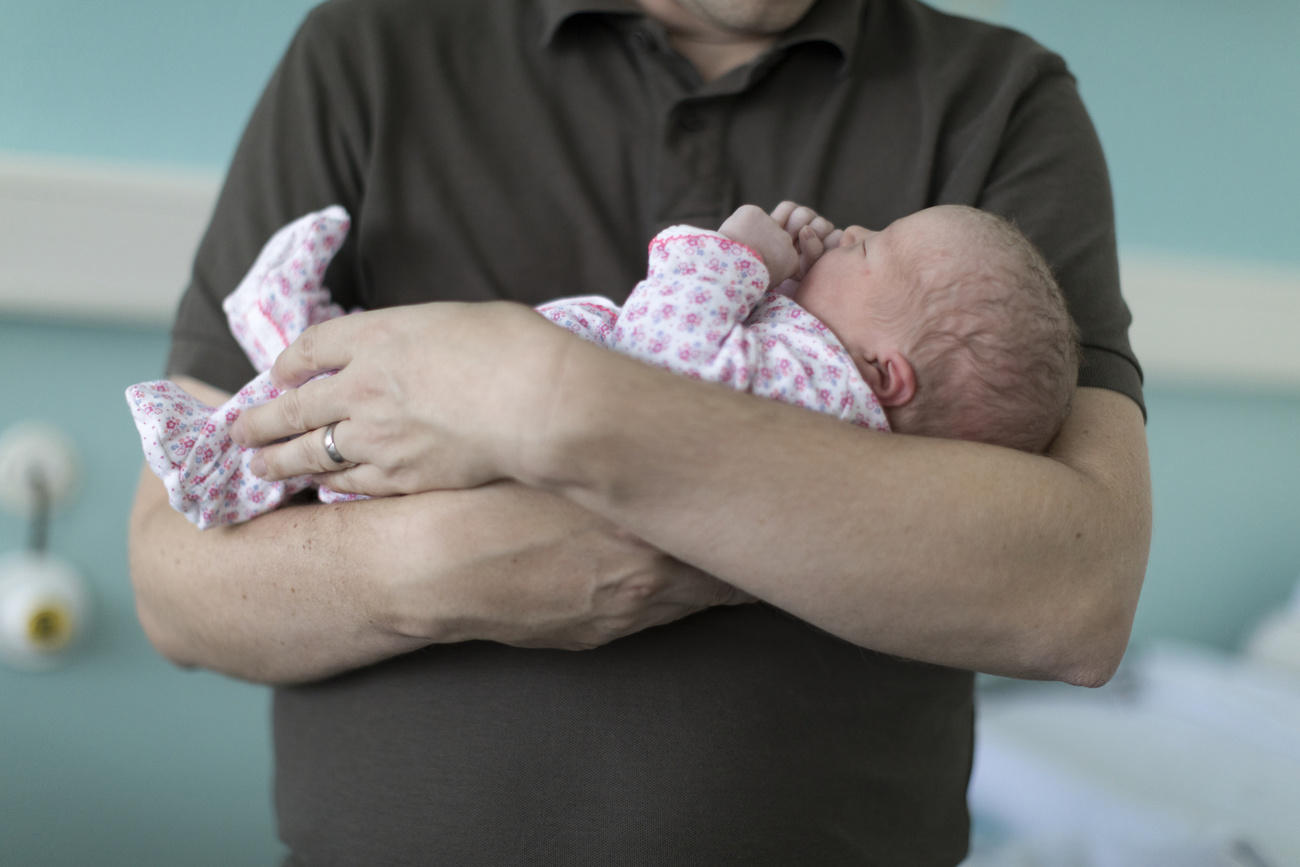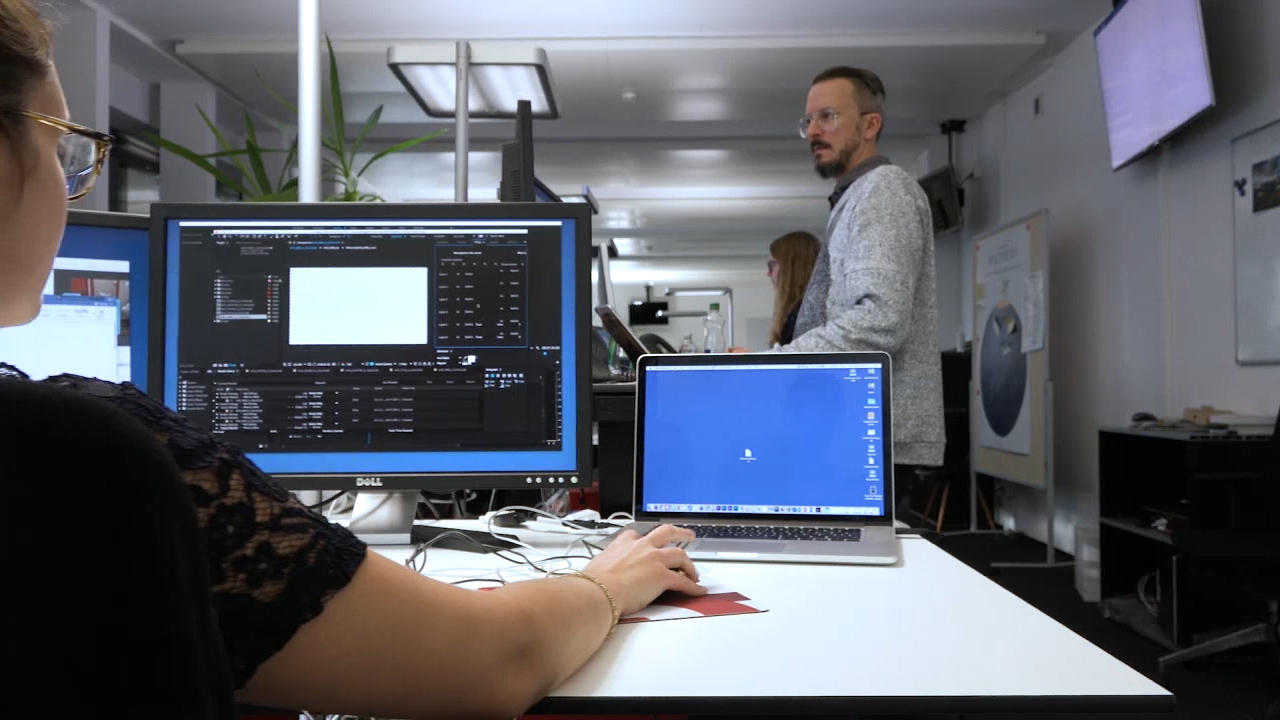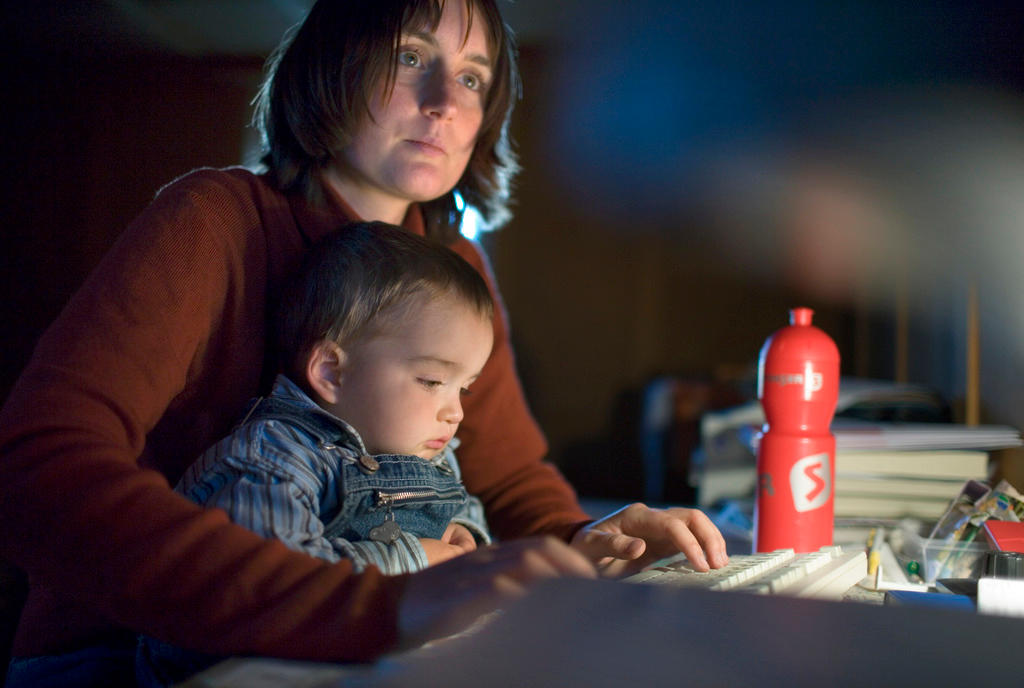Why are Swiss mums assumed to be ‘stay-at-home’?

A reader asked if it’s true that Swiss women tend to become stay-at-home mums once they have children. Although the data clearly shows this is no longer the case, women do commonly shoulder most of the childcare and housework, and are more likely to step back from their careers once children come along.
Much has changed in the last 30 years. Whereas in 1991 about 40% of mothersExternal link were not in paid work, today only a small proportion of women with children – about one in five – are stay-at-home mums, the Federal Statistical Office reports.
The office also reports that most women, especially those with a post-secondary education, return to work within the first year after giving birth.
That said, the majority of working mothers in Switzerland are employed part-time (see infographic below), whereas the European Union average is about 37%External link.
In fact, the most common arrangement for Swiss couplesExternal link with children these days is strikingly reminiscent of the traditional family model of working dad and stay-at-home mum prevalent several decades ago. Although he is no longer the sole breadwinner, the father still tends to hold down a full-time job, while the mother works part-time. By contrast, few dads (11%) have a part-time job, while among most couples without children, both partners work full time.
The data, in other words, reveals something of a paradox: a progressive society of working women who also happen to be part-time stay-at-home mums and therefore shoulder the primary responsibilityExternal link for housework and childcare. In an interview with the lead researcher of a comprehensive analysisExternal link of family life in Switzerland, a journalist was compelled to askExternal link, “It sounds like a scene from the 1950s … Can the Swiss mum still be found behind the stove?” To which the researcher, Clémentine Rossier, replied: “In any event, she is far less emancipated than we’d like to believe.”
Part-time workers, part-time stay-at-home mums
For foreigners as for the Swiss, the association of Switzerland with traditional family mores remains a difficult one to overcome. More than a third of men and about a quarter of women believe that a child suffersExternal link when the mother works outside the home, data from the Federal Statistical Office shows.
Such thinking can come as a shock to expats, who in recent years have rated the country poorly for work-life balance. One Zurich-based father wrote that “the vast majority of people are very surprised to hear that I stay at home and even more surprised when they find out that my wife works full time.”
The reasons why mothers and fathers in Switzerland continue to follow gendered roles can be traced to the country’s historically liberal, non-interventionist approach to family policy, whereby the state leaves the care of children strictly to the private sphere.
“The social and economic structures that were created back when the so-called ‘male breadwinner model’ formed the basis of family and work life are still strongly present in our society and continue to bring this idea that if someone has or wants a child, it’s a private affair,” says Francesco Giudici at the Statistical Office for canton Ticino.
The effects of this approach can be felt in the workplace and society more broadly, he adds. For instance, the fact that current legislation mandates a 14-week maternity leave but just one day for fathers encourages an unequal distribution of childcare within the couple almost from the start, Giudici notes in a 2017 analysisExternal link of the situation for working mothers.
Although parliament approved a two-week statutory paternity leave this past September, Giudici believes this change – if it goes ahead – won’t make much difference in how men and women split work and family responsibilities among themselves.
“Even if an equal parental leave were introduced, there are other factors that could continue to favour traditional norms and practices in the division of labour between mothers and fathers,” he says.

More
Parliament votes for two-week paternity leave
One such factor is the progressive taxation of married couples, Giudici points out, which effectively discourages both partners from working full time, since having a higher combined income means paying more taxes.
And since women often earn less than men, it is they who usually reduce their work hours or stop working entirely.
A predestined reality
According to the most recent survey on families in Switzerland, some 70% of young women fear that having a child will have negative consequences on their career prospects. Researcher Clémentine Rossier says that the system shapes women’s expectations about the work-family life balance.
“They choose ‘female’ professions and lower-paid career paths which are easier to come back to [after having children],” the University of Geneva professor tells swissinfo.ch. “Then, when the question arises as to who should spend time with the kids, it is always her since her earning power is lower and she is prepared for such a move.”
Another result of the liberal approach to family policy is the lack of childcare facilities, which are expensive to boot.
“A large share of the population is still against small children being taken care of outside the family,” Rossier says, although attitudes tend to become positive once external childcare is well established and of high quality. This is the case particularly in cities and in French-speaking Switzerland, says the professor of demography.
In Switzerland, 30% of children under age threeExternal link attend some kind of childcare facility, which is just below the EU average of 34% but far below countries like Denmark (70%) and Sweden (57%). Many families with children under age 13 (42%) rely instead on their entourageExternal link, such as grandparents, for care.
The age of children at home also has a telling impact on mothers’ workforce participation. Those with preschoolers are slightly less likely to be professionally active: about three-quarters of mothers with a child younger than four years old have a job, compared with 85% of mothers of teenagers.
Mothers of young kids also work fewer hours (often less than a 50% work weekExternal link) than women with older children.

More
Fact checks by SWI swissinfo.ch: How we work
Giudici’s research revealed that the more children a woman has, the less likely she is to be employed. The cost of childcare, which increases with each child, is a probable factor.
Even as the children get older, working parents must still find childcare solutions, since the school day is shorter than the work day and many communes do not offer school meals, says Giudici.
An elusive balance
Given these social and policy structures, it’s little wonder that finding a fair balance between professional and family responsibilities for both parents is tough, as Rossier and Giudici acknowledge.
Juggling work and family life in Switzerland is so difficult in practice, says Rossier, that the only women who tend to work full time are those who are compelled to do so because of a low household income. Single mothers, for example, have a higher rate of labour-force participation than mothers with a live-in partner, and are also less likely to work part-time (see infographic above).
Unlike Giudici, Rossier sees some hope in a future paternal leave. Those early days are crucial for the long term, she says, and a more generous leave would afford both parents time to get acquainted with their newborn and “share the new tasks equally”.
“Otherwise, being with a baby remains unfamiliar to fathers, and mothers over-specialise in it,” explains Rossier.
And that’s a pattern that can persist even as the child gets older, she adds.
This article is part of an ongoing series of fact checks driven by our readers, who wrote in with suggestions of claims about Switzerland we should verify. You can catch up on previous fact checks from the series under Related Stories below.

In compliance with the JTI standards
More: SWI swissinfo.ch certified by the Journalism Trust Initiative














You can find an overview of ongoing debates with our journalists here . Please join us!
If you want to start a conversation about a topic raised in this article or want to report factual errors, email us at english@swissinfo.ch.